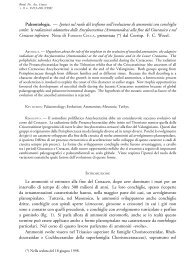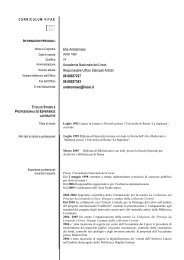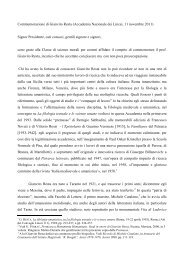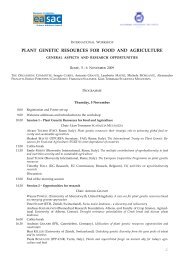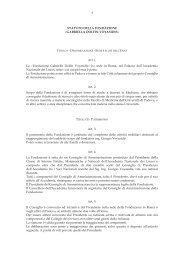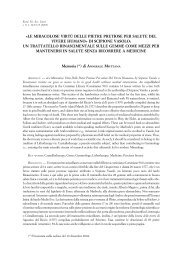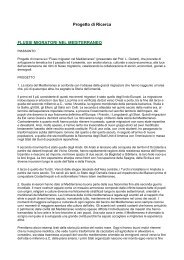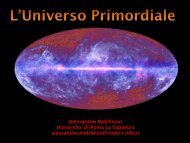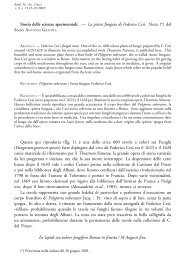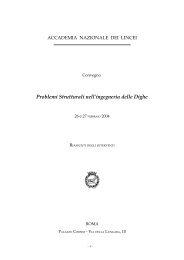Bollettino dei Classici - Accademia Nazionale dei Lincei
Bollettino dei Classici - Accademia Nazionale dei Lincei
Bollettino dei Classici - Accademia Nazionale dei Lincei
Create successful ePaper yourself
Turn your PDF publications into a flip-book with our unique Google optimized e-Paper software.
F. M. Petrucci, Un equivoco filologico: il De partibus philosophiae dello Pseudo-Galeno, i Prolegomena<br />
philosophiae di Davide e il ms. Vaticano Greco 2253……………………………………………………..” 83<br />
Nota della Redazione…………………………………………………………………………………………." 97<br />
Appendice: Indice <strong>dei</strong> fascicoli Serie terza XXI (2000) – XXX (2009)……………………………………... ” 99<br />
ABSTRACT<br />
8<br />
I. (M.P. Pattoni): In the codex Laurentianus Mediceus the paragraphos at Choeph. 929 assigns 928 to Clytemesrra<br />
and 929-930 to Orestes. However, the vast majority of recent editors - among whom Page, Garvie, Bowen, West<br />
and, Iately, Somrnerstein - folIows Scaligerus' proposal to assign also 929 to Clytemestra and maintain only 930, the<br />
final line of the stichomythia, as Orestes' eue. In fact, both the dramatic cornposition of this stichomythia, in<br />
comparison with other similar passages, and arguments regarding formal aspects lead to the concIusion that the<br />
solution transmitted by the manuscripts is correct.<br />
II. (P. Tavonatti): Franciscus Portus was a Cretan hurnanist of 16th century. He studied under Arsenius of<br />
Monembasia and then came to Italy, where he taught Greek language and literature in Modena and at the University<br />
of Ferrara. Persecuted in Venice because of his adhesion to Protestantism, he escaped in Switzerland and in Geneva<br />
he was elected Publicus professor of Greek at the loeal Academy by John Calvin hirnself. Portus was interested in<br />
many topics (Homer, Hesiod, Pindar, Aristoteles, Xenophon, Hellenistic poetry, rhetors and grammarians) and<br />
among them he studied Aeschylus too. His work on the first of great tragedians ìs represented by the ms. B.P.L.<br />
180, the first western commentary on alI survived plays by Aeschylus, based on Vettori-Estienne's edition, and the<br />
cod. 756 D 22, another exemplar of Vettori's edition who presents in the borders many conjectures and annotations.<br />
Both these autographs are conservcd in Leiden University Library. These works are only recently rediscovered by<br />
Mund-Dopchie and, after her, by M.L.West, who has adopted in his edition some conjectures of Portus.<br />
This artiele presents some conclusions from the analysis of B.P.L. 180 (subjeet of rny doetoral dissertation at the<br />
University of Trento): some variae lectiones, not attested in 16 th eentury editions, and scholia, unpublished at that<br />
time, put into perspectivc that a manuscript could be among Portus' sources far his work on Aeschylus. Many of<br />
these extravagantes forns are equivalent to tbe reading of the triclinian tradition (and T in partieular): this lets things<br />
(although there is no proof) that Portus could have known the work of the great byzantine scholar.<br />
III. (A. Perruccio): The paper argues for the manuscript tradition, so that no conjectures are needed in two<br />
Aeschylean passages. (a) Ag. 813-16 divka" ga;r oujk ajpo; glwvssh" qeoi; / kluvonte" ajndroqnh'ta" jIlivou<br />
fqora;" ej" aiJmathro;n teu'co" ouj dicorrovpw" / yhvfou" e[qento. In spite of Karsten's conjecture jIlioufqovrou"<br />
(adopt. Fraenke1), West and Sommerstein support Dobree's reading fqora'". The author suggests retaining the<br />
manuscript tradition: 1. the recall of Eur. Or. lO12 (West) does not appear appropriate; 2. the transmitted fqoravs<br />
gives acceptable sense in close predicative link to yhvfou" («evotes as acts I instances of destroying Troy»). (b) Ag.<br />
1196-97 ejkmartuvrhson proumovsa" to; m∆ eijdevnai / lovgwi pavlai tw'nd∆ aJmartiva" dovmwn. The emendation to;<br />
mh; eijdevnai recalls "a procedural device of the Athenian lawcourts", according to which a witness was required to<br />
swear on oath that he didn't know "the statement to be true" (Sommerstein). Nevertheless, a deeper insight into other<br />
passages, showing Cassandra asking the Chorus to witness for her being ajlhqovmanti" (vv. 1184-5; 1240-55),<br />
should confirm the reading to; mh; eivdevnai.<br />
IV. (F. Boschetti): This article studies the semantic spaces based on tbe lemmatized corpus of ancient Greek texts. A<br />
semantic space is a computational model based on the word distribution of a corpus, in order to represent semantic<br />
similarity by spatial proximity. Even if statistical methods cannot provide textual evidences, philologists can be<br />
assisted by explorative tools that suggest lists of words semantically related when they conceive or evaluate<br />
conjectures. In this study four semantic spaces have been generated. The first is based on the entire collection of<br />
Greek texts and the others are based on subcorpora: the Homeric poems, the corpus of the Greek tragedy with<br />
related scholia and the corpus of the philosophers. Each semantic space shows its peculiarities, strictly connected<br />
with the different genres. Semantic relations observed in the semantic spaces are distributed both on the syntagmatic<br />
and the paradigmatic axis: synonymy, hypernymy, holonymy, antonymy are the relations among the closest terms in<br />
lists of associations generated by the computational tools used to explore the semantic spaces. Finally, semantic<br />
spaces based on chronological subcorpora allow us to study terms that have preserved or changed their meanings,<br />
Keywords: synonymity, antonymy, semantic spaces, computational linguistics, lemmatized corpus.<br />
V. (A. Natale): The Polycrates commended in the poem discovered in P. Oxy. 1790 - Ibyc. fr. S 151 Dav. - is most<br />
probably the master of Sarnos when, still young and not yet a tyrant, he was the descendant of a wealthy and




